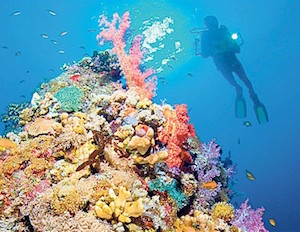 What can we do to help ocean coral survive Global Warming? In this TACC podcast, Jorge Salazar looks at how researchers are using the Stampede supercomputer to investigate how Corals can genetically adapt to warmer waters.
What can we do to help ocean coral survive Global Warming? In this TACC podcast, Jorge Salazar looks at how researchers are using the Stampede supercomputer to investigate how Corals can genetically adapt to warmer waters.
“The computational resources of the Texas Advanced Computing Center played a huge role in actually enabling these analysis,” said Mikhail ‘Misha’ Matz from the University of Texas at Austin. His group dived through terabytes of sequencing data to fish out pearls, tolerance-associated genes, using global gene expression analysis and quantitative trait loci mapping. To get them required genotyping of the entire coral genome individually in more than 300 tiny coral larvae. “To boil this down to an actual answer of what biological processes are responsible for your feature of interest, this requires an intricate and multi-stage bioinformatic pipeline, much of it taken up by TACC computers.”
The study, “Genomic determinants of coral heat tolerance across latitudes,” appeared in the journal Science, June of 2015. The authors are Groves Dixon, Sarah Davies, Galina Aglyamova, and Mikhail Matz of the Department of Integrative Biology, University of Texas at Austin; Eli Meyer, Department of Integrative Biology, Oregon State University; and Line Bay, Australian Institute of Marine Science. Study funding came from the National Science Foundation and the Australian Institute of Marine Science. Bioinformatics analysis was performed with computational resources of the Texas Advanced Computer Center, The University of Texas at Austin.
Study Abstract: Genomic Determinants of Coral Heat Tolerance Across Latitudes
“As global warming continues, reef-building corals could avoid local population declines through “genetic rescue” involving exchange of heat-tolerant genotypes across latitudes, but only if latitudinal variation in thermal tolerance is heritable. Here, we show an up–to–10-fold increase in odds of survival of coral larvae under heat stress when their parents come from a warmer lower-latitude location. Elevated thermal tolerance was associated with heritable differences in expression of oxidative, extracellular, transport, and mitochondrial functions that indicated a lack of prior stress. Moreover, two genomic regions strongly responded to selection for thermal tolerance in interlatitudinal crosses. These results demonstrate that variation in coral thermal tolerance across latitudes has a strong genetic basis and could serve as raw material for natural selection.”
Read the Full Story * Download the Study * Sign up for our insideHPC Newsletter



